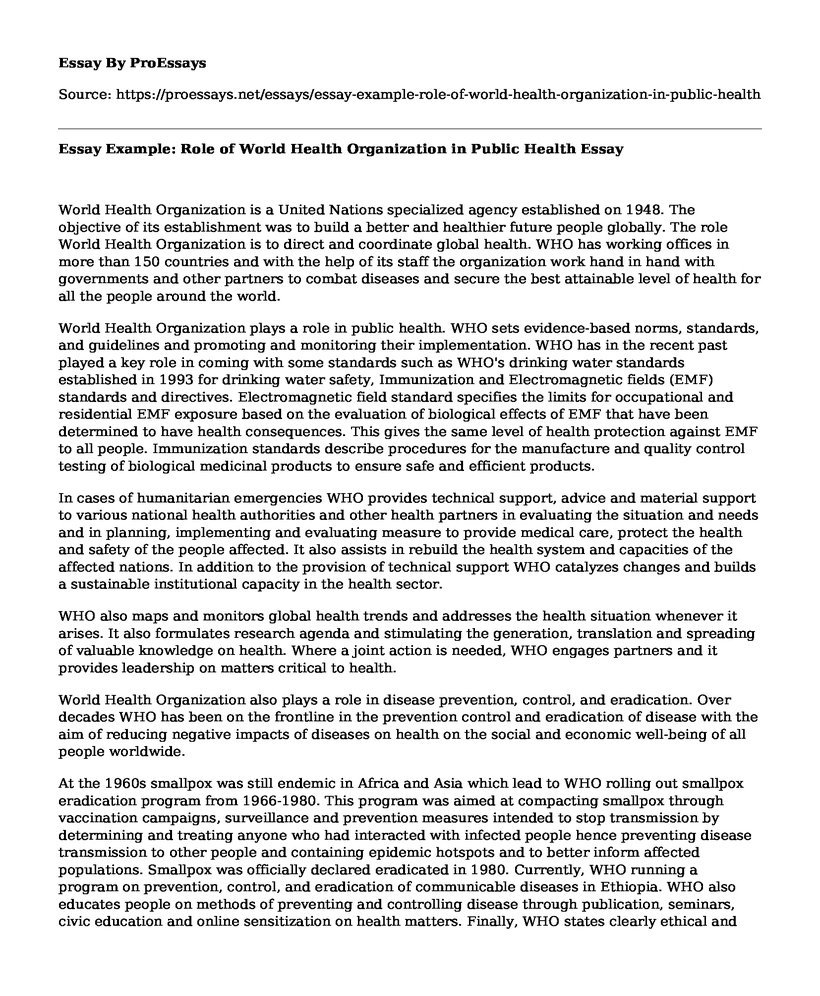World Health Organization is a United Nations specialized agency established on 1948. The objective of its establishment was to build a better and healthier future people globally. The role World Health Organization is to direct and coordinate global health. WHO has working offices in more than 150 countries and with the help of its staff the organization work hand in hand with governments and other partners to combat diseases and secure the best attainable level of health for all the people around the world.
World Health Organization plays a role in public health. WHO sets evidence-based norms, standards, and guidelines and promoting and monitoring their implementation. WHO has in the recent past played a key role in coming with some standards such as WHO's drinking water standards established in 1993 for drinking water safety, Immunization and Electromagnetic fields (EMF) standards and directives. Electromagnetic field standard specifies the limits for occupational and residential EMF exposure based on the evaluation of biological effects of EMF that have been determined to have health consequences. This gives the same level of health protection against EMF to all people. Immunization standards describe procedures for the manufacture and quality control testing of biological medicinal products to ensure safe and efficient products.
In cases of humanitarian emergencies WHO provides technical support, advice and material support to various national health authorities and other health partners in evaluating the situation and needs and in planning, implementing and evaluating measure to provide medical care, protect the health and safety of the people affected. It also assists in rebuild the health system and capacities of the affected nations. In addition to the provision of technical support WHO catalyzes changes and builds a sustainable institutional capacity in the health sector.
WHO also maps and monitors global health trends and addresses the health situation whenever it arises. It also formulates research agenda and stimulating the generation, translation and spreading of valuable knowledge on health. Where a joint action is needed, WHO engages partners and it provides leadership on matters critical to health.
World Health Organization also plays a role in disease prevention, control, and eradication. Over decades WHO has been on the frontline in the prevention control and eradication of disease with the aim of reducing negative impacts of diseases on health on the social and economic well-being of all people worldwide.
At the 1960s smallpox was still endemic in Africa and Asia which lead to WHO rolling out smallpox eradication program from 1966-1980. This program was aimed at compacting smallpox through vaccination campaigns, surveillance and prevention measures intended to stop transmission by determining and treating anyone who had interacted with infected people hence preventing disease transmission to other people and containing epidemic hotspots and to better inform affected populations. Smallpox was officially declared eradicated in 1980. Currently, WHO running a program on prevention, control, and eradication of communicable diseases in Ethiopia. WHO also educates people on methods of preventing and controlling disease through publication, seminars, civic education and online sensitization on health matters. Finally, WHO states clearly ethical and evidence-based health policy options to be adopted by different nations for sustainable development.
In conclusion, World Health Organization plays a critical role in public health. WHO has been involved many programs in the world aimed at preventing, controlling, and eradicating diseases to secure the best health for everyone. A good example is howWHO got involved in the management of Ebola outbreak in West Africa. The organization also funds biomedical research programs and create public awareness on health matter.
References
The role of WHO in public health. (n.d.). Retrieved March 13, 2017, from http://www.who.int/about/role/en/
Cite this page
Essay Example: Role of World Health Organization in Public Health. (2021, Apr 15). Retrieved from https://proessays.net/essays/essay-example-role-of-world-health-organization-in-public-health
If you are the original author of this essay and no longer wish to have it published on the ProEssays website, please click below to request its removal:
- Article Review Sample - Placebo Use in the UK
- Impact of Caffeine on Our Health Paper Example
- Nursing Professional Responsibility to Deal With an Aging Population Essay
- Essay Sample on Home Nursing
- Nurse-Sensitive Indicators: Assessing Quality of Care - Essay Sample
- Paper Example on Patient Education in Dealing with Chronic Renal Failure: A Literature Review
- Experiencing Autism: The Challenges, Isolation, and Need for Change in Utah - Free Essay







